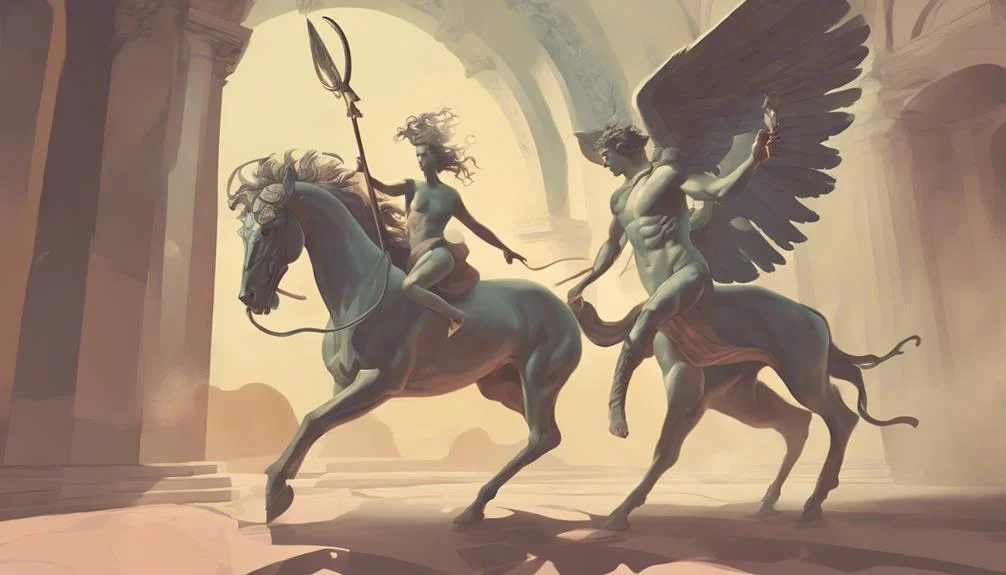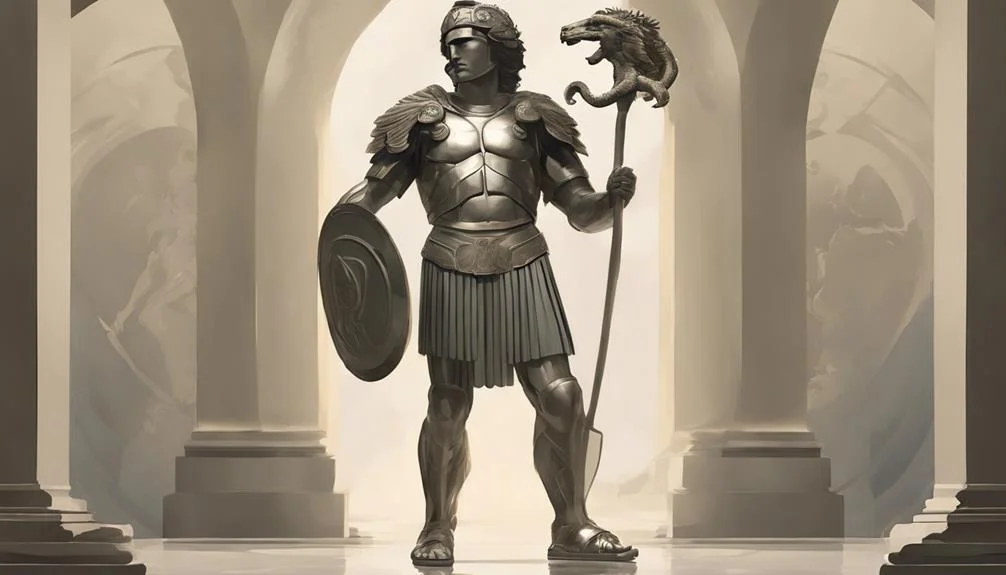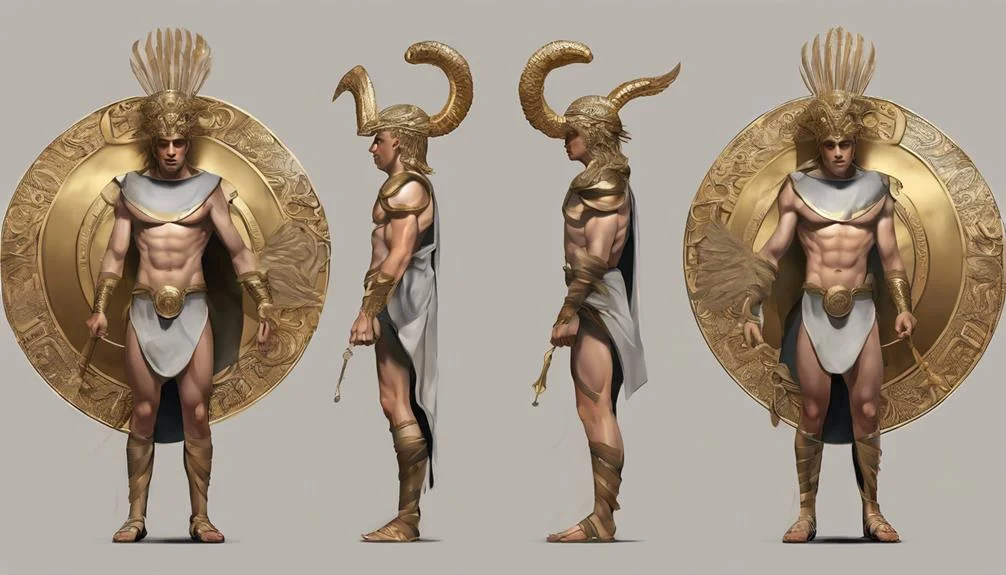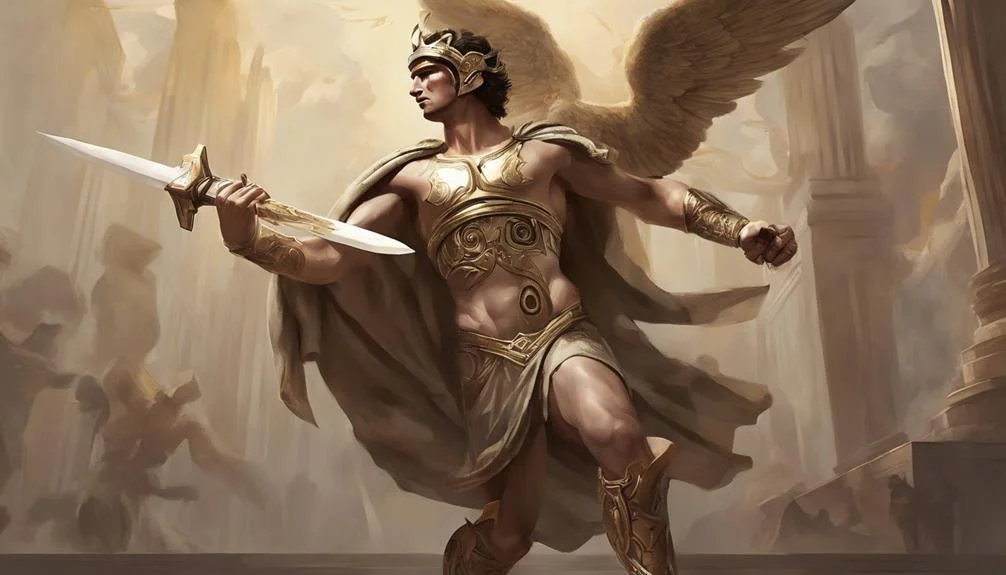Summary
Discover the depths of Perseus' name, which signifies courage, heroism and divine favor in Greek mythology. Discover the layers of symbolism behind this legendary figure, from his role as slayer of monsters and son of Zeus to his legacy as protector and brave hero. Delve into the deep meanings embedded in the name Perseus, reflecting timeless virtues and noble qualities that continue to resonate across cultures and generations.
The mythological origins of Perseus

Discover the fascinating mythological origins of Perseus and his heroic journey through Greek mythology. Perseus was the son of Danaë, a mortal princess, and Zeus, the king of the gods. His story begins with a prophecy that predicted that one day his grandfather, King Acrisius, would be killed by Danaè's son. To avoid this fate, Acrisius locked Danaeus and Perseus in a chest and threw them into the sea. Miraculously they survived and ended up on the beach of the island of Seriphos.
Perseus grew up on the island in the custody of Dictis while the tyrant king Polydectes sought to marry Danae. To get rid of Perseus, Polydectes sent him on a seemingly impossible mission: to bring the head of Medusa, a monstrous Gorgon whose gaze turned people to stone. With the help of Athena and Hermes, Perseus succeeded in killing Medusa, using her head as a weapon in later adventures.
Perseus' journey is a classic tale of courage, cunning and divine intervention, making him one of the most renowned heroes in Greek mythology.
Symbolism in the name Perseus
Let us examine the deeper and more symbolic meaning embedded in the name Perseus, shedding light on the various levels of meaning behind the moniker of this iconic Greek hero.
- Monster Slayer: Perseus is famous for killing Medusa, a monstrous Gorgon with snakes for hair. The name Perseus may symbolize courage in the face of terrifying challenges.
- Son of Zeus: Perseus is the son of Zeus, the king of the gods. The name could carry connotations of strength, power and divine favor.
- Light Bearer: Perseus used a reflective shield to avoid looking directly at Medusa, using the reflection to guide his blows. This act of using light to defeat darkness could symbolize wisdom and ingenuity.
- Protector of the Innocents: Perseus saved Andromeda from a sea monster, showing his protective nature. The name Perseus could symbolize heroism and selflessness in defending the vulnerable.
Perseus in Greek mythology

Discover the compelling story of Perseus in Greek Mythology, immersing yourself in his heroic deeds and divine lineage. Perseus, son of Zeus, the king of the gods, and Danaë, a mortal princess, was destined for greatness. His grandfather, King Acrisius of Argos, fearing a prophecy predicting his death at the hands of his grandson, threw Perseus and his mother into the sea in a wooden box. Miraculously they survived and came ashore on the island of Seriphos.
Perseus grew up to become a brave hero known for killing Medusa, a monstrous Gorgon whose gaze petrified people. Equipped with a reflective shield, winged sandals and a magic sword of the gods, he succeeded in this difficult feat. He also saved Princess Andromeda from a sea monster and later married her.
Perseus' adventures are legendary in Greek mythology, portraying him as a brave hero with divine blood flowing through his veins. His exploits continue to captivate audiences with tales of valor and triumph.
Perseus: Hero or Criminal?
Is Perseus really a hero or could there be more to his story than meets the eye? Perseus, known for killing Medusa and saving Princess Andromeda, is often hailed as a hero in Greek mythology. However, his actions raise questions about his true character. Here are four points to ponder:
- Complex Motivations: Although Perseus performed heroic deeds, some of his actions were motivated by personal gain or revenge, blurring the line between heroism and self-interest.
- Questionable Methods: The way Perseus obtained Medusa's head by deceiving the Graeae could be considered deceptive, questioning his moral integrity.
- Unintended Consequences: Despite his good intentions, Perseus caused unintended harm, such as turning Atlas into a mountain with Medusa's head.
- Arch of Redemption: Perseus also showed hero qualities by overcoming challenges and using his abilities for noble purposes, suggesting a potential arc of redemption in his story.
Considering these aspects, the characterization of Perseus as hero or villain becomes a matter of interpretation, showing the complexity of his mythological figure.
Perseus Among Diverse Cultures

Investigating Perseus' presence in various cultures reveals fascinating adaptations and interpretations of this legendary figure. In Greek mythology, Perseus is known to have killed Medusa and saved Princess Andromeda. However, in Norse mythology, a similar character named Per is said to have killed the monstrous wolf Fenrir during Ragnarok. The parallels between these myths suggest a universal theme of heroism overcoming great challenges.
In Celtic culture, Perseus shares similarities with the hero Lleu Llaw Gyffes, who overcame a series of obstacles to achieve his destiny. In Japanese folklore, the legendary figure Susanoo bears similarities to Perseus in his battles against powerful adversaries. These cross-cultural connections highlight the enduring appeal of the hero's journey archetype.
In addition, in Native American mythology, the twin Apache heroes, Nayenezgani and Tobadzistsini, display Perseus-like traits as they embark on quests to defeat malevolent forces. These different interpretations of Perseus across cultures show the timeless nature of heroic tales and their ability to transcend geographic boundaries.
The Binding of Perseus in Art
We investigate how Perseus' legacy has been immortalized through various art forms. From intricate sculptures capturing his heroic feats to vivid paintings depicting his battles with mythological creatures, Perseus has been a popular subject for artists throughout history. Even in modern art, the figure of Perseus continues to inspire new interpretations and creative expressions.
Perseus in sculpture
Discover the enduring influence of Perseus in sculpture through the wide range of artistic interpretations that have preserved this legendary figure in art history. Perseus, the hero of Greek mythology known for killing Medusa, has inspired sculptors for centuries, resulting in various depictions that capture his prowess and cunning. Here are four ways Perseus has made his mark on the world of sculpture:
- Classical representations: Sculptors in ancient Greece often depicted Perseus with the severed head of Medusa, showing his triumphant victory over the monstrous Gorgon.
- Renaissance Revival: During the Renaissance period, artists such as Benvenuto Cellini created intricate bronze sculptures of Perseus, highlighting the hero's mythological mastery.
- Neoclassical interpretations: In the 1700s and 1800s, sculptors adopted the neoclassical style to depict Perseus with idealized proportions and heroic poses, emphasizing his role as a legendary figure.
- Modern adaptations: Contemporary artists continue to reinterpret Perseus in sculpture, mixing traditional techniques with modern influences to breathe new life into this timeless myth.
Perseus in paintings
Investigating the eternal artistic influence of Perseus, the hero of Greek mythology, through various paintings reveals the timeless legacy he holds in the art world. Perseus has been a popular subject for painters throughout history, with his epic stories of killing Medusa and rescuing Princess Andromeda capturing the imagination of artists for centuries. One of the most famous depictions of Perseus is in the painting 'Perseus with the Head of Medusa' by Italian artist Caravaggio, which shows the hero holding the severed head of the gorgon, his expression a mix of triumph and horror.
Another notable painting is 'Perseus and Andromeda' by British artist Frederic Leighton, which depicts the dramatic moment when Perseus throws himself to rescue Andromeda from the sea monster. The dynamic compositions and emotional depth in these works reflect Perseus' enduring appeal as a symbol of courage, heroism, and victory over adversity. Through these masterpieces, Perseus continues to inspire and enchant viewers with his legendary deeds.
Perseus in modern art
Investigating the enduring impact of Perseus in modern art reveals the hero's continuing influence on contemporary artistic expressions. Artists of various techniques have drawn inspiration from Perseus' mythological exploits, adapting his story to echo current audiences. This is how Perseus remains a prominent figure in modern art:
- Sculptures: Sculptors have captured Perseus' iconic clash with Medusa in intricate detail, displaying his skill and cunning in breathtaking three-dimensional forms.
- Digital Art: In the digital domain, the adventures of Perseus are reimagined through innovative digital animations and illustrations, giving new life to ancient tales.
- Street Art: Graffiti artists often incorporate Perseus into their murals, mixing classical mythology with urban aesthetics to create engaging works of street art.
- Contemporary Paintings: Modern painters continue to depict Perseus' encounters with mythological creatures, using vibrant colors and bold techniques to reinterpret his legendary exploits for today's art enthusiasts.
Modern interpretations of Perseus

Modern interpretations of Perseus offer a fresh perspective on this legendary figure. From his appearances in popular culture to his embodiment of heroism, Perseus continues to engage audiences and retain symbolic significance in today's world. Investigating how this ancient myth remains relevant and impactful in contemporary society.
Perseus in popular culture
Modern interpretations of Perseus in pop culture often portray him as a heroic figure who faces various challenges and overcomes them with cunning and courage. Today, Perseus continues to inspire stories, films, and works of art that capture his essence as a legendary hero.
Here are four ways you might encounter Perseus in pop culture:
- Film: Hollywood has embraced Perseus, featuring him in films such as 'Clash of the Titans,' where he battles mythological creatures like Medusa and the Kraken.
- Video games: In the world of video games, you can don Perseus' sandals in games like 'God of War,' where you face epic quests and battles inspired by Greek mythology.
- Comics: Comic books often reinvent Perseus, giving him modern overtones and placing him in superhero universes.
- Literature: Perseus appears in various novels and graphic novels, offering new perspectives on his adventures and character.
Through these means, Perseus remains a timeless symbol of courage and ingenuity, engaging audiences with his enduring heroic spirit.
Perseus as Hero
In modern interpretations, Perseus emerges as a timeless hero celebrated for his courage and ingenuity in overcoming formidable challenges. Unlike the traditional image of a hero who relies solely on strength, Perseus displays the power of intellect and ingenuity. His iconic murder of Medusa, the Gorgon whose gaze turned men to stone, exemplifies his strategic thinking and bravery. Perseus' use of reflective surfaces to avoid eye contact with Medusa demonstrates his ability to think creatively under pressure, making him a model for problem solving in difficult situations.
Moreover, Perseus' journey to save Princess Andromeda from the sea monster Ceto portrays him as a compassionate hero moved by a sense of justice. His willingness to face danger to save others highlights his selflessness and noble character. These qualities resonate with modern audiences, who admire individuals who display both physical strength and mental acumen in the face of adversity. Perseus continues to inspire contemporary storytelling, demonstrating that heroism transcends time and culture.
Symbolism of Perseus Today
Perseus' enduring symbolism in contemporary narratives reflects a combination of courage, intelligence and compassion that resonates with today's audiences. His character embodies values that many aspire to adhere to in their own lives. Here are four ways in which Perseus' symbolism remains relevant in modern interpretations:
- Courage in the face of adversity: Perseus' reckless nature serves as a reminder to meet challenges head-on, no matter how intimidating they may seem.
- Strategic thinking and problem solving: Perseus' resourcefulness in defeating enemies such as Medusa underscores the importance of intelligence and cunning in overcoming obstacles.
- Empathy and kindness: Perseus' compassion toward others, such as his rescue of Princess Andromeda, shows the power of empathy and altruism in making a positive impact on the world.
- Legacy of heroism: Perseus' legacy as a legendary hero inspires individuals to aim for greatness and make a lasting difference in the world, no matter their circumstances.
Frequently asked questions
What is the etymology of the name Perseus?
The name 'Perseus' originates in the Greek mythology, where Perseus was a hero known for killing Jellyfish. The name itself is believed to derive from the Greek word 'pertho,' meaning 'to destroy' or 'to waste.' This connects well with the heroic deeds of Perseus in Greek mythology. So when you hear the name Perseus, remember its roots in ancient Greek stories of courage and triumph over adversity.
Are there lesser known myths about Perseus?
There are indeed some lesser-known myths about Perseus. One such story involves his encounter with the Graie, three old sisters who shared an eye and a tooth with each other. Perseus was able to overcome them to discover the location of Medusa. Another interesting story is his involvement in the search for the Golden Fleece along with Jason and the Argonauts. These lesser-known myths add depth to Perseus' character and adventures.
How did Perseus influence popular culture?
Perseus has had a great impact on popular culture through various transpositions in movies, TV series and books. His story of killing Medusa and other heroic deeds has inspired countless creators to incorporate his myth into their works. From Clash of the Titans a Percy Jackson, Perseus continues to be a beloved figure in modern storytelling, showing courage, perseverance and the triumph of good over evil in an engaging way.
Was Perseus considered a hero in all cultures?
In various cultures, Perseus was seen as a hero, but not universally. Some saw him as a courageous figure who defeated monsters and performed daring feats. Others saw him as a complex character with flaws. The interpretation of Perseus as a hero varied according to the cultural beliefs and narratives of different societies. It is intriguing to investigate how perceptions of heroism may differ across cultures, adding depth to the character of Perseus.
What is the significance of Perseus' weapons?
When examining the importance of Perseus' weapons, it is crucial to consider how each played a crucial role in his heroic deeds. From the reflective shield that helped him defeat Medusa to the winged sandals that aided his swift movements, each weapon symbolized a specific aspect of his journey. These tools were not just tools; they represented strength, strategy, and divine assistance in overcoming formidable challenges.
